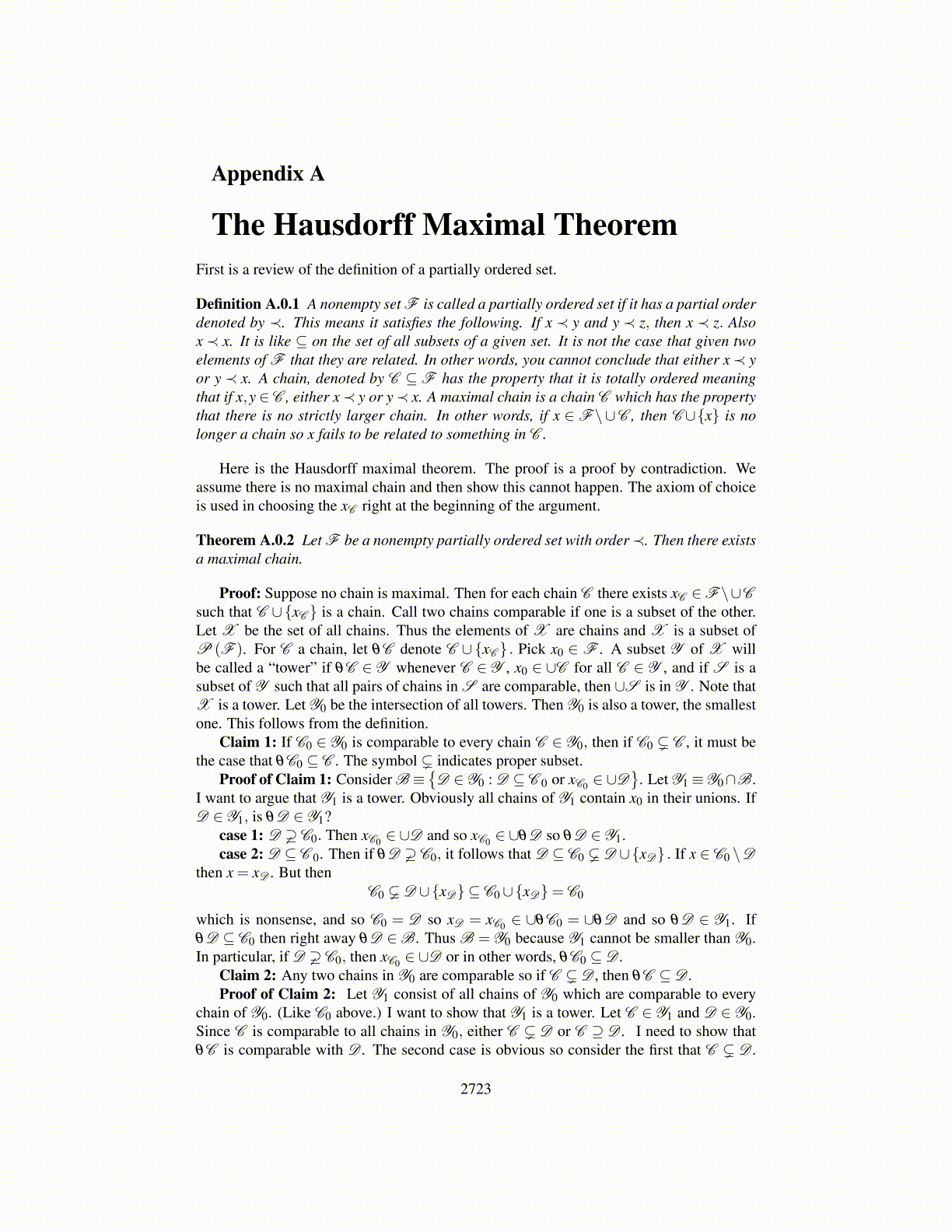
79.4. STOCHASTIC INCLUSIONS WITHOUT UNIQUENESS ?? 2723
79.4.3 The Main TheoremWe first consider an easier problem and then obtain the result by taking limits. Let U bea Banach space that is compactly embedded and dense in V . Also, let F : U →U ′ be theduality map
⟨Fu,u⟩= ∥u∥rU , ∥Fu∥U ′ = ∥u∥
r−1U ,
where r > max(2, p). Such a Banach space always exists and is important in probabilitytheory where (i,U,V ) is an abstract Wiener space but you can also get it in most applica-tions to partial differential equations from Sobolev embedding theorems. Then the abovehas proved the following main theorem.
Theorem 79.4.11 Suppose 1 - 79.4.2 with λ = 0, and suppose f is progressively measur-able and is in Lp′
(Ω;Lp′ ([0,T ] ;V ′)
). Also let F be the duality map for r ≥ max(2, p)
which maps U to U ′ for U a separable Banach space contained and dense in V. Let
Φ ∈ L2([0,T ]×Ω,L2
(Q1/2H,H
))∩L2
(Ω;L∞
([0,T ] ;L2
(Q1/2H,H
)))Also suppose that for each n ∈ N, there is a progressively measurable un,zn such that
un (t)−u0 +1n
∫ t
0Funds+
∫ t
0znds =
∫ t
0f ds+
∫ t
0ΦdW, zn ∈ Â(un)
Then there exists a solution u,z to the inclusion
u(t)−u0 +∫ t
0zds =
∫ t
0f ds+
∫ t
0ΦdW, z ∈ Â(u) in U ′
ω
where both u,z are progressively measurable. If U is compact in V and if for every ε > 0there exists µε ≥ 0 such that u→ µε u+εFu+Au is strictly monotone as a map from U toU ′, then the above hypothesis is satisfied.
The reason for assuming λ = 0 is that it is hard to show 79.4.57 otherwise. As noted,it may be possible to reduce to this case using an exponential shift argument. Other thanthat, it appears you almost have to have A + µI monotone for suitable µ which wouldend up yielding uniqueness. This is because in order to get the necessary estimates, youwould need to have a Cauchy sequence for certain martingales in M2
T an appropriate spaceof continuous martingales. This will end up requiring an assumption of monotonicity. IfΦ = 0 then of course there would be no problem. Right now, I don’t have good examples.
The significant thing about this is that there may be no uniqueness of solutions to theevolution inclusion for fixed ω but there exists a progressively measurable solution. Thecase where Φ is replaced by σ (u) is currently unsolved as far as I know unless one hasuniqueness of the evolution inclusion for fixed ω . It may well be possible to do somethingon this in case σ is Lipschitz continuous. I don’t know yet. If σ is only continuous, I ampretty sure this will not be possible because there are examples where strong solutions donot exist. It should be possible to consider
Bu(t)−Bu0 +∫ t
0zds =
∫ t
0f ds+B
∫ t
0ΦdW